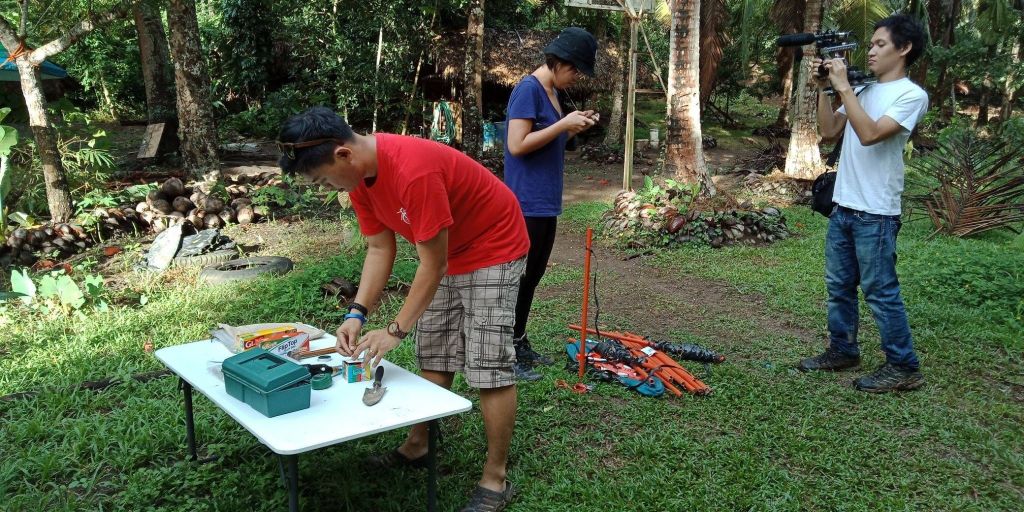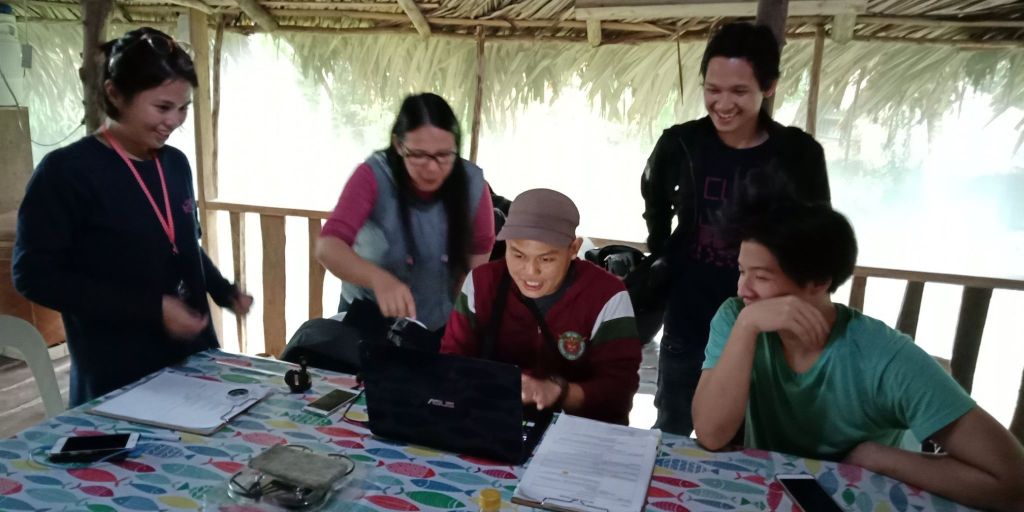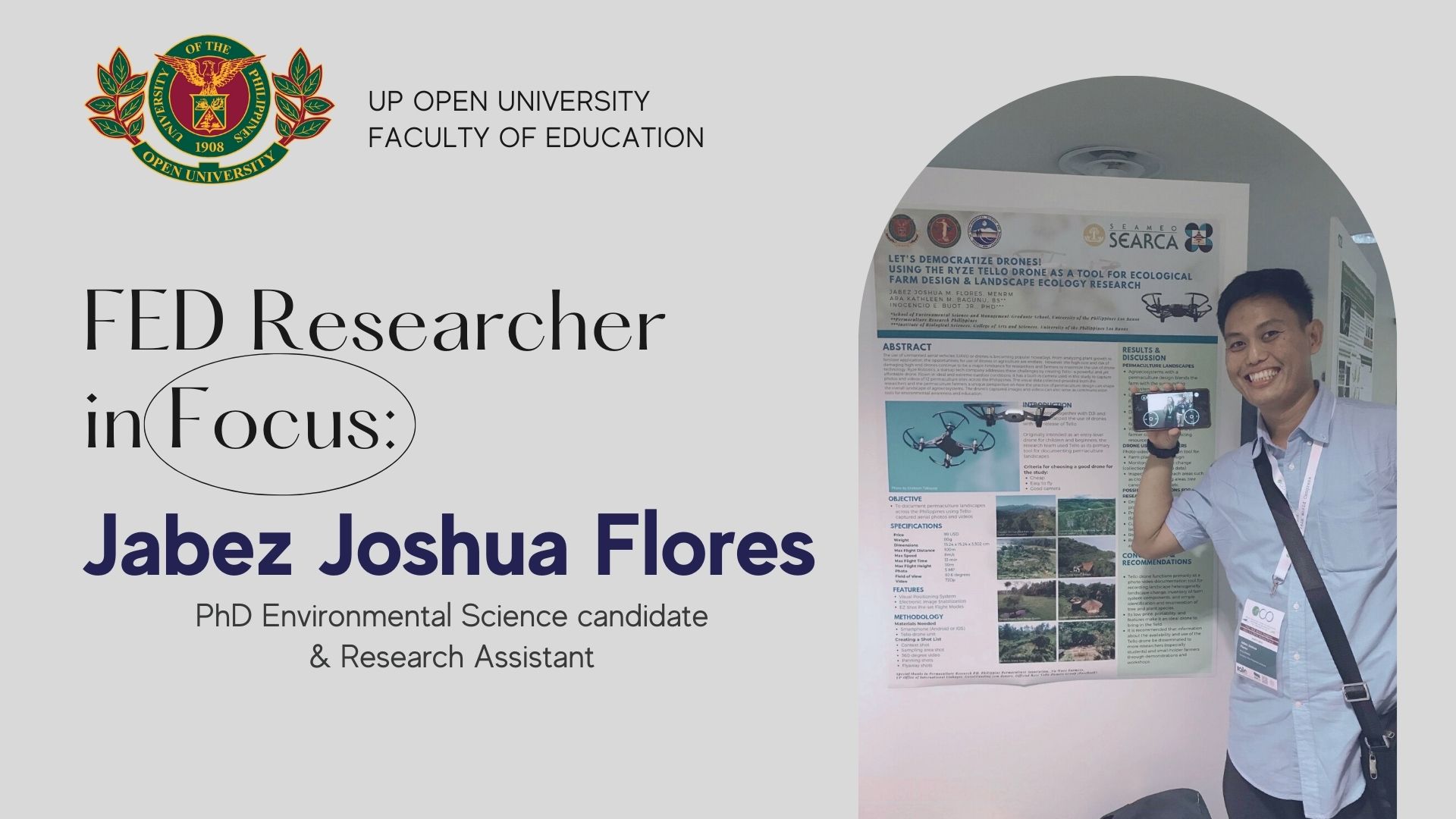“Dynamic, adaptive, and flexible,”
That is how Jabez Joshua Flores described himself as a researcher, with research being his day and night job. Flores is a research assistant at the University of the Philippines Open University (UPOU) and a PhD Environmental Science candidate at the School of Environmental Science and Management (SESAM) in the University of the Philippines Los Baños (UPLB).
He credits his drive for research from his humble beginnings at the UPOU, where he took it slowly but surely and has not stopped since. At first, he took non-formal courses. He then immediately enrolled in the Master of Environment and Natural Resources Management (MENRM) program. Days after earning his Masters, he enrolled in a PhD program.
Despite the heavy workload of being a graduate student, Flores considered deadlines and submissions as “something to look forward to”. It was also during his time in the University that his critical thinking and creative skills were honed.
Looking back, Flores recounts how his childhood also set him up for the world of research. Even at an early age, Flores was curious about how things came to be.
“Growing up, I have a wide range of interests and my curiosity about people, the natural world, and the universe, in general, continues to this day. I love geography, history, languages, wildlife and nature, architecture and design, space, physics, and technology.”
Trivial as it may seem, Flores points out how the shows on Discovery Channel and National Geographic Channel that he enjoyed watching as a kid further fueled his desire to become a researcher.
His parents were also instrumental in developing this inclination to research. While his current research interests are more focused on the fields of agroecology and permaculture, landscape ecology, network science, and environmental communication, Flores always tries to formulate research questions beyond what his discipline allows him to do.

In photo: Jabez setting up sampling plots in Quezon with research assistant, Ara Bagunu and documentary filmmaker, Brian Sulicipan (2018). Photo credit: Michael Reyes, Jr.
Flores eventually developed a passion for data gathering and storytelling. He notes that his favorite part of the research process is doing fieldwork and presenting findings. Another bright side of doing research, according to him, is that it’s a character-building process.
“It teaches a person to become patient and humble. And even if you succeed, the hard times remind you to stay grounded.”
Flores goes a step further by ensuring that his research is disseminated and is usable by other aspiring researchers. Some of his engagements and projects include a UPOU Networks episode on permaculture design, a Philippine permaculture map, a permaculture bibliography, and talks on climate change. He also freely shares his work on ResearchGate and in his own dedicated blogsite: Permaculture Research PH.
A researcher, however, does not simply write and publish. Flores believes that “researchers have a crucial role in nation-building, promoting sustainable development, and communicating science to the masses”. He emphasizes the importance of good quality research as the basis for policies and decision-making in the country.
“Tayo yung, ‘studies show…’ and ‘based on a study by…’ I always admired the research behind those statements and it is my dream to become part of those phrases in the future and say, ‘study namin yan!’ haha. One phrase can go a long way.”

In photo (L-R): Jabez with research assistants Ara Bagunu, Criselda Dorothi Mercado, with filmmaker Brian Sulicipan and DLSU graduate student Seaver Choy. Photo credit: Michael Reyes, Jr.
However, as with many things in life, Flores’ research journey is paved with challenges. The seemingly never ending revisions when writing the manuscript proved to be one of Flores’ struggles. Pair this with drafting grant proposals and receiving several rejections from submitting journal articles, he opened up about the fear of doing a study that is not good enough or unworthy of funding.
To overcome these, Flores points to a somewhat cliché yet successful solution, “try and try until you succeed”.
It also helps to have a constant child-like curiosity. Flores notes that with the problems the society is facing today, from the climate crisis to the COVID-19 pandemic, come an abundance of research questions waiting to be answered and pondered on. With this, he shares a piece of advice to aspiring young researchers:
“As long as we have these challenges, there is always an opportunity for research. It never ends, it’s a lifelong career.”
Written by: SPManrilla & TLQuilnat

